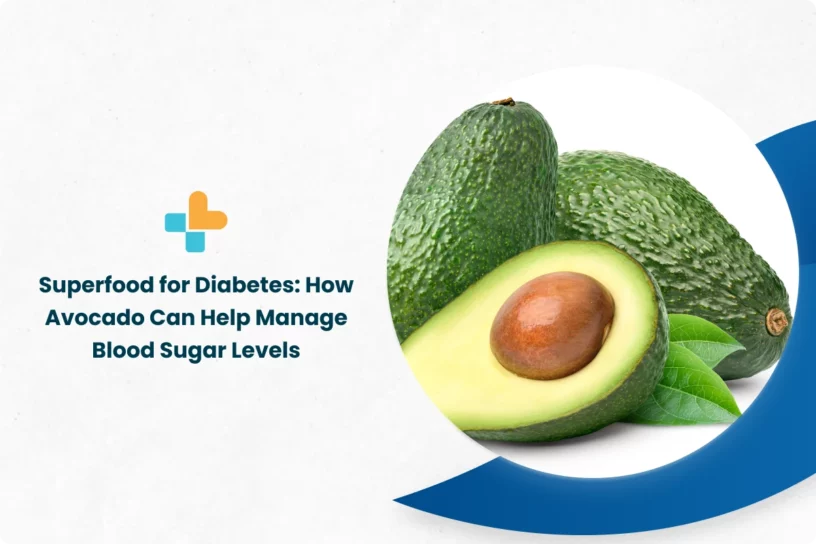Avocado has gained popularity in recent years as a versatile and nutritious food. But did you know that it can also be beneficial for people with diabetes? Avocado is low in carbs and high in healthy fats, fiber, and nutrients that can help regulate blood sugar levels. In this article, we’ll explore the science behind avocados’ potential benefits for diabetes and provide practical tips for incorporating this superfood into your diet. Whether you have diabetes or are simply looking for a healthy and delicious addition to your meals, read on to discover the many reasons why avocado is good for diabetes.

Avocado Nutritional Information
Here’s a table for the nutritional information of one medium-sized avocado (approximately 150 grams) based on data from the USDA National Nutrient Database:
| Nutrient | Amount per 150g Avocado |
| Calories | 250 |
| Total fat | 23g |
| Saturated fat | 3.5g |
| Trans fat | 0g |
| Cholesterol | 0mg |
| Sodium | 10mg |
| Total Carbohydrates | 13g |
| Dietary Fiber | 10g |
It’s important to note that the nutritional content of avocados can vary depending on factors such as ripeness, variety, and growing conditions. However, the table above provides a general overview of the nutrients found in a medium-sized avocado.
Relationship between Avocado & Diabetes
Avocado can be beneficial for people with diabetes due to its low carb content, high fiber and healthy fat content, and potential blood sugar regulating properties. The high fiber and healthy fat content in avocados can help slow down the digestion of carbohydrates, leading to a more gradual rise in blood sugar levels after meals.
Additionally, avocado contains certain compounds such as polyunsaturated fatty acids and antioxidants that have been linked to improved insulin sensitivity and reduced inflammation, both of which are important for managing diabetes. However, as with any food, it’s important to consume avocado in moderation and in the context of a balanced diet tailored to individual needs and preferences.
Benefits of Avocado for People with Type-2 Diabetes
- Avocado won’t cause spikes in blood sugar:
One of the biggest challenges for people with diabetes is managing blood sugar levels. Avocado is low in carbohydrates and has a low glycemic index, meaning it won’t cause significant spikes in blood sugar levels after consumption. This can help individuals with diabetes maintain more stable blood sugar levels throughout the day.
- Avocado is a good source of fiber:
Fiber is an important nutrient for people with diabetes as it can help regulate blood sugar levels and improve digestive health. Avocado is a good source of both soluble and insoluble fiber, which can help slow down the absorption of sugar in the bloodstream and promote feelings of fullness.
- Avocado may help with weight loss and improve insulin sensitivity:
Obesity and insulin resistance are common risk factors for type-2 diabetes. Avocado has been shown to aid in weight loss and improve insulin sensitivity in overweight and obese individuals, which can help reduce the risk of developing diabetes or better manage existing diabetes.
- Avocado is loaded with healthy fats:
Unlike other fruits, avocados are high in healthy fats such as monounsaturated and polyunsaturated fats. These healthy fats have been shown to improve cholesterol levels and reduce inflammation, both of which are important for managing diabetes.

How to eat an Avocado?
There are many ways to eat an avocado, depending on personal preference and the desired dish. Here are some common ways to eat avocado:
- As a spread or dip: Mash ripe avocado and spread it on toast, use it as a sandwich spread, or make guacamole by mixing it with tomatoes, onions, and lime juice.
- In salads: Add diced or sliced avocado to salads for a creamy and nutritious addition.
- Grilled or roasted: Cut the avocado in half, remove the pit, and grill or roast it for a warm and savory side dish.
- In smoothies: Blend avocado with other fruits and vegetables for a creamy and nutrient-dense smoothie.
- In desserts: Use avocado as a healthier alternative to butter or oil in baked goods such as brownies or chocolate mousse.
Side Effects of Avocado that you should be aware of
While avocado is generally considered safe for most people, there are a few potential side effects that you should be aware of:
- Allergic reactions: Some people may be allergic to avocado, which can cause symptoms such as itching, swelling, hives, and difficulty breathing.
- Interference with medication: Avocado may interfere with the absorption of certain medications due to its high-fat content. If you are taking any medication, it’s important to check with your healthcare provider before consuming avocado.
- High in calories: Avocado is high in healthy fats, but it is also high in calories. Eating too much avocado can lead to weight gain if not consumed in moderation.
- Gastrointestinal issues: Eating too much avocado or eating it too quickly can cause gastrointestinal issues such as bloating, gas, and stomach discomfort.
- Interference with blood thinners: Avocado contains vitamin K, which can interfere with blood thinners such as warfarin. If you are taking blood thinners, it’s important to speak with your healthcare provider before consuming avocado.
As with any food, it’s important to consume avocado in moderation and in the context of a balanced diet tailored to individual needs and preferences. If you experience any adverse effects after consuming avocado, stop consuming it and speak with your healthcare provider.
Read Also: World Primary Immunodeficiency Week- April 2023
Conclusion
In conclusion, avocado is a nutritious and beneficial fruit for people with type-2 diabetes due to its low carbohydrate content, high fiber and healthy fat content, and potential blood sugar regulating properties. It can be consumed in various ways as a spread, dip, salad ingredient, or in desserts, among others. However, it’s important to consume it in moderation and to be aware of potential side effects, such as allergic reactions, interference with medication, and gastrointestinal issues.
At Ayu Health, we understand the challenges that come with managing diabetes and are committed to providing personalized care to help you manage your condition. Our team of healthcare professionals and registered dietitians can work with you to develop a customized diabetes management plan that fits your individual needs and lifestyle.
Contact us today to learn more about how we can support you on your journey to better health.
Our Hospital Locations
General Surgery Hospitals in Chandigarh | General Surgery Hospitals in Bangalore | General Surgery Hospitals in Jaipur | General Surgery Hospitals in NCR | General Surgery Hospitals in Hyderabad
Our Doctors
General Surgery Doctors in Chandigarh | General Surgery Doctors in Bangalore | General Surgery Doctors in Jaipur | General Surgery Doctors in NCR | General Surgery Doctors in Hyderabad
About the Author

Dr. S. Goel
Dr. S. Goel is a renowned Internal Medicine Specialist currently practicing at Ayu Health, Bangalore. He is a Specialist in Internal Medicine, Diabetes HTN, Paediatric Care, and Family Medicine.




